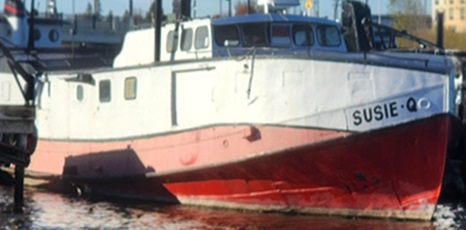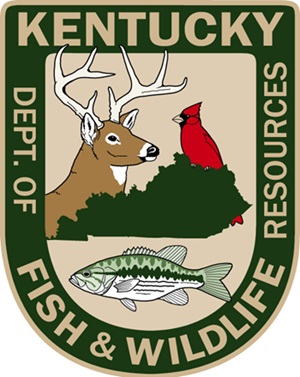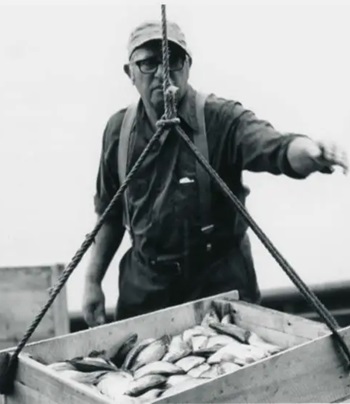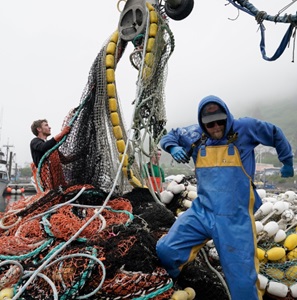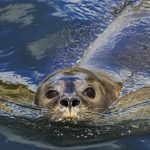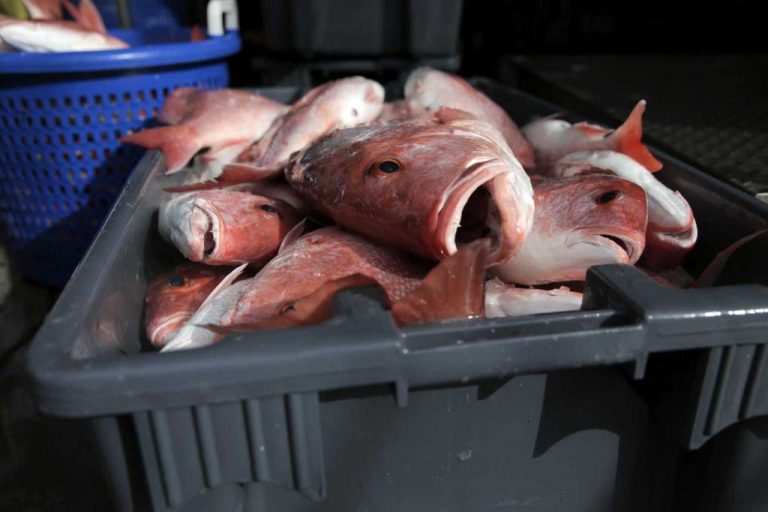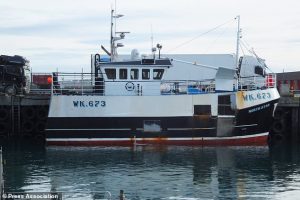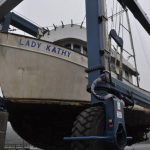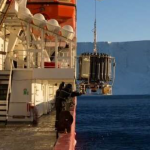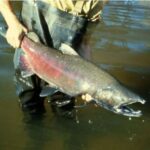Category Archives: Inland Fisheries
Sea lamprey control program receives OK to rehire federal workers, after initial scare
 The Great Lakes’ Sea lamprey control program has the OK to rehire three dozen federal employees it needs to combat the eel-like, invasive fish species. That’s after staffing cuts and hiring freezes from the Trump administration last month threatened the work, which the Great Lakes Fishery Commission said would have led to more than $200 million in lost fishing potential. The Great Lakes Fishery Commission is a Canadian American commission which coordinates lamprey control across the Great Lakes region. Each year, the commission contracts workers with the U.S. Fish and Wildlife Service to set traps and apply lampricide in rivers, stopping lamprey before they enter the Great Lakes. more, >>CLICK TO READ<< 10:40
The Great Lakes’ Sea lamprey control program has the OK to rehire three dozen federal employees it needs to combat the eel-like, invasive fish species. That’s after staffing cuts and hiring freezes from the Trump administration last month threatened the work, which the Great Lakes Fishery Commission said would have led to more than $200 million in lost fishing potential. The Great Lakes Fishery Commission is a Canadian American commission which coordinates lamprey control across the Great Lakes region. Each year, the commission contracts workers with the U.S. Fish and Wildlife Service to set traps and apply lampricide in rivers, stopping lamprey before they enter the Great Lakes. more, >>CLICK TO READ<< 10:40
Fishing tug sinks at Howdenvale dock
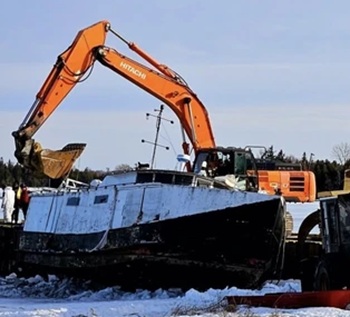 Another tugboat has sunk while tied up at a government dock on the Lake Huron side of the Bruce Peninsula, most recently earlier this month at Howdenvale. The Canadian Coast Guard said Friday in an emailed response to questions that it received a report on March 10 that “Keep the Change,” a 30-foot fishing tug, was sinking at the harbour and diesel was released into the water. The vessel owner and Chippewas of Nawash Fisheries Assessment Program staff deployed an absorbent boom and pads. The Coast Guard also deployed a containment boom around the vessel to limit the spread of pollution, the email said. more, >>CLICK TO READ<< 10:40
Another tugboat has sunk while tied up at a government dock on the Lake Huron side of the Bruce Peninsula, most recently earlier this month at Howdenvale. The Canadian Coast Guard said Friday in an emailed response to questions that it received a report on March 10 that “Keep the Change,” a 30-foot fishing tug, was sinking at the harbour and diesel was released into the water. The vessel owner and Chippewas of Nawash Fisheries Assessment Program staff deployed an absorbent boom and pads. The Coast Guard also deployed a containment boom around the vessel to limit the spread of pollution, the email said. more, >>CLICK TO READ<< 10:40
Scientists at U.S. weather forecasting agency ordered to get clearance before talking to Canadian counterparts
 Travelling for international meetings or even joining a call with Canadian counterparts has become impossible for some U.S. government scientists, under new directives since U.S. President Donald Trump took office. Canadian ecologist Aaron Fisk says he recently tried to set up a virtual call to discuss plans with American colleagues, including a government scientist, around sampling fish. “We tried to have a quick meeting with one of our collaborators … and they were denied access,” Fisk said. Given that the Great Lakes — and their aquatic life — straddle both sides of the border, having American scientists suddenly barred from meetings has had deep impacts. That, combined with funding freezes, is drastically altering the way science works in North America, at least for now. Fisk, who is the Canada Research Chair in Changing Great Lakes Ecosystems at the University of Windsor, receives funding from the U.S. National Oceanic and Atmospheric Administration (NOAA) for his work. more, >>CLICK TO READ<< 19:44
Travelling for international meetings or even joining a call with Canadian counterparts has become impossible for some U.S. government scientists, under new directives since U.S. President Donald Trump took office. Canadian ecologist Aaron Fisk says he recently tried to set up a virtual call to discuss plans with American colleagues, including a government scientist, around sampling fish. “We tried to have a quick meeting with one of our collaborators … and they were denied access,” Fisk said. Given that the Great Lakes — and their aquatic life — straddle both sides of the border, having American scientists suddenly barred from meetings has had deep impacts. That, combined with funding freezes, is drastically altering the way science works in North America, at least for now. Fisk, who is the Canada Research Chair in Changing Great Lakes Ecosystems at the University of Windsor, receives funding from the U.S. National Oceanic and Atmospheric Administration (NOAA) for his work. more, >>CLICK TO READ<< 19:44

Big Abe’s Net
One calm September morning in 1971, Big Abe LeBlanc got ready to go fishing on Lake Superior. This was something he often did in secret, under the cover of darkness, hiding from the Michigan Department of Natural Resources. But on this particular day, Big Abe called the DNR before he left. “I just remember him saying that, you know, ‘This is where I’ll be, and if you want me, come get me,’” said his son, Sonny LeBlanc. It was 1971. And Big Abe, who’s Ojibwe, was preemptively turning himself in for two crimes, at least according to Michigan law. The first crime: commercial fishing without a license. The second: fishing with illegal equipment. After Big Abe hung up, he went out on the lake, set his nets and waited for the officers to come. What happened next changed fishing in the Great Lakes forever. more, >>CLICK TO READ<< 09:45
“THE FISH THIEF: A Great Lakes Mystery”
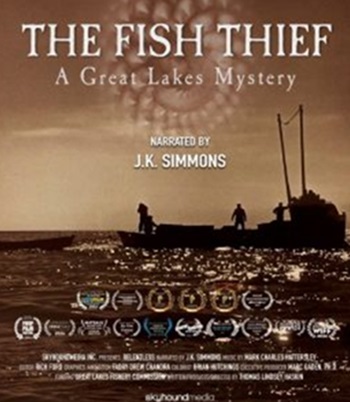 “THE FISH THIEF,” narrated by Oscar-winning actor J.K. Simmons, delves into the extraordinary effort to uncover the cause of a devastating environmental crisis. Was it overfishing, pollutants, or something else? Scientists on both sides of the border worked tirelessly to solve the mystery. In a dramatic eleventh-hour breakthrough, they discovered the true culprit: the invasive sea lamprey. This notorious predator arrived in the Great Lakes in the early twentieth century, triggering an ecological crisis and nearly wiping out populations of lake trout, whitefish, and other cornerstone species. The impact reverberated across the region, ruining local industries, damaging small town economies and indigenous communities, and destroying the livelihoods of people on both sides of the U.S. and Canadian border. A dedicated group of international scientists, policymakers, and conservationists banded together in a race against time to address this ecological invasion. more, >>CLICK TO READ<< 10:42
“THE FISH THIEF,” narrated by Oscar-winning actor J.K. Simmons, delves into the extraordinary effort to uncover the cause of a devastating environmental crisis. Was it overfishing, pollutants, or something else? Scientists on both sides of the border worked tirelessly to solve the mystery. In a dramatic eleventh-hour breakthrough, they discovered the true culprit: the invasive sea lamprey. This notorious predator arrived in the Great Lakes in the early twentieth century, triggering an ecological crisis and nearly wiping out populations of lake trout, whitefish, and other cornerstone species. The impact reverberated across the region, ruining local industries, damaging small town economies and indigenous communities, and destroying the livelihoods of people on both sides of the U.S. and Canadian border. A dedicated group of international scientists, policymakers, and conservationists banded together in a race against time to address this ecological invasion. more, >>CLICK TO READ<< 10:42
Toxic Blade Time Bomb
 We have documented the threats of industrial wind turbines to both soil and water in their pre and post-construction phases, not to mention birds, bats, insects, and humans. But not enough has been said about the serious environmental threat of “blade shedding.” This is erosion that occurs primarily on the edge of turbine blades as they are exposed to the elements. And it is far from benign: “Microplastic shedding from turbine blades, known as Leading Edge Erosion, is a great concern to manufacturers who are forced to repair the damage that occurs after only a couple of years. The particles eroded from blades include epoxy which is 40% Bisphenol-A (BPA), a frequently banned endocrine disruptor and neurotoxin. Academic research has shown the potential for 137 pounds of epoxy microparticles to be shed per turbine per year.” Mark Twichell, Citizens Against Wind Turbines in Lake Erie, October 29, 2022, The Buffalo News more, >>CLICK TO READ<< 08:32
We have documented the threats of industrial wind turbines to both soil and water in their pre and post-construction phases, not to mention birds, bats, insects, and humans. But not enough has been said about the serious environmental threat of “blade shedding.” This is erosion that occurs primarily on the edge of turbine blades as they are exposed to the elements. And it is far from benign: “Microplastic shedding from turbine blades, known as Leading Edge Erosion, is a great concern to manufacturers who are forced to repair the damage that occurs after only a couple of years. The particles eroded from blades include epoxy which is 40% Bisphenol-A (BPA), a frequently banned endocrine disruptor and neurotoxin. Academic research has shown the potential for 137 pounds of epoxy microparticles to be shed per turbine per year.” Mark Twichell, Citizens Against Wind Turbines in Lake Erie, October 29, 2022, The Buffalo News more, >>CLICK TO READ<< 08:32
Salvage efforts remove fishing tug from Stokes Bay waters
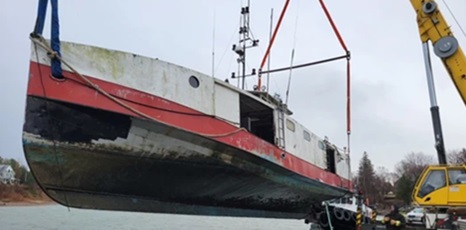 The Coast Guard refloated the FV Gary M at the Stokes Bay dock for the second time in less than three months, but this time it was taken to Southampton and put on dry land. The fishing tug was lifted out on Nov. 26, as shown in a Coast Guard photo, and was placed on the government pier in Southampton, at the mouth of the Saugeen River. It was reported partly sunk Nov. 20 in Stokes Bay. It remained in Southampton Thursday. more, >>CLICK TO READ<<
The Coast Guard refloated the FV Gary M at the Stokes Bay dock for the second time in less than three months, but this time it was taken to Southampton and put on dry land. The fishing tug was lifted out on Nov. 26, as shown in a Coast Guard photo, and was placed on the government pier in Southampton, at the mouth of the Saugeen River. It was reported partly sunk Nov. 20 in Stokes Bay. It remained in Southampton Thursday. more, >>CLICK TO READ<<
After a dramatic decline, lake trout have recovered in most of Lake Superior
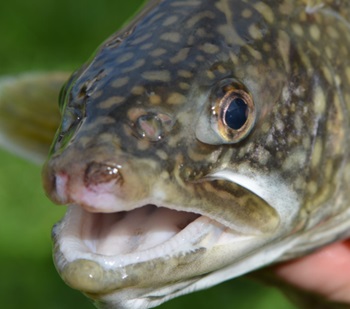 After decades of work, fishery managers say lake trout have fully recovered in most of Lake Superior after the invasive, fish-killing sea lamprey decimated their numbers. The Lake Superior Committee of the Great Lakes Fishery Commission, which is made up of state, tribal and Canadian natural resource managers, announced the population’s recovery Wednesday. The lake trout population in Lake Superior dropped to dramatically low levels during the mid-1900s due to overfishing and an invasion of sea lampreys, eel-like parasites that suck the blood of their hosts. The parasitic fish spread to the Great Lakes from the Atlantic Ocean, invading Lake Superior by 1938. more, >>CLICK TO READ<< 11:03
After decades of work, fishery managers say lake trout have fully recovered in most of Lake Superior after the invasive, fish-killing sea lamprey decimated their numbers. The Lake Superior Committee of the Great Lakes Fishery Commission, which is made up of state, tribal and Canadian natural resource managers, announced the population’s recovery Wednesday. The lake trout population in Lake Superior dropped to dramatically low levels during the mid-1900s due to overfishing and an invasion of sea lampreys, eel-like parasites that suck the blood of their hosts. The parasitic fish spread to the Great Lakes from the Atlantic Ocean, invading Lake Superior by 1938. more, >>CLICK TO READ<< 11:03
Save LBI Stays Course Despite Trump’s Promise to Kill Offshore Wind
 While President-elect Donald Trump is expected to make sweeping changes to the national energy policy, including doing away with offshore wind on Day 1 of his new term, a local grassroots organization isn’t letting that news get in its way of fighting the construction of what is poised to be the country’s largest wind farm some 9 miles off the coast of Long Beach Island. “We will be filing major lawsuits by the end of the month to invalidate at least some of those prior federal approvals,” Bob Stern, president and cofounder of Save LBI, said just days after voters returned Trump to office for a second term. “In addition, we will be seeking to have the lease area itself canceled so that new projects will not be resurrected in the future.” more, >>CLICK TO READ<< 15:05
While President-elect Donald Trump is expected to make sweeping changes to the national energy policy, including doing away with offshore wind on Day 1 of his new term, a local grassroots organization isn’t letting that news get in its way of fighting the construction of what is poised to be the country’s largest wind farm some 9 miles off the coast of Long Beach Island. “We will be filing major lawsuits by the end of the month to invalidate at least some of those prior federal approvals,” Bob Stern, president and cofounder of Save LBI, said just days after voters returned Trump to office for a second term. “In addition, we will be seeking to have the lease area itself canceled so that new projects will not be resurrected in the future.” more, >>CLICK TO READ<< 15:05
Saskatchewan ‘s cold-water fish is making waves on the European market
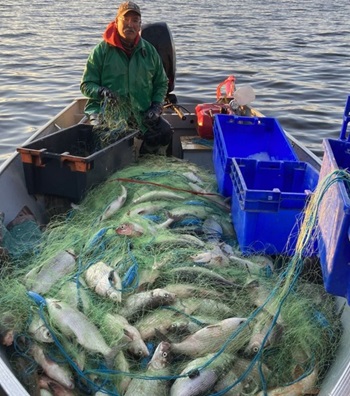 Once the temperature drops, the fishing industry heats up in a small village in northern Saskatchewan thanks to the tullibee and after five years it’s still going strong. “They are saving the Pinehouse fishing industry,” said Lionel Smith, commercial fisherman from his home on Pinehouse Lake. The tullibee, also known as a northern cisco, lake herring or chub, is a small roughly two-pound fish found in northern cold-water lakes. Once, commercial fishermen in Pinehouse would cast the petite fish from their nets in favour of much larger and tastier fish. But food connoisseurs across the ocean have changed that narrative. The once seemingly undesirable fish is harvested for its roe and is a rare delicacy in Europe. As a result, the tullibee is providing a lucrative income for fish harvesters. photos, more, >>CLICK TO READ<< 12:09
Once the temperature drops, the fishing industry heats up in a small village in northern Saskatchewan thanks to the tullibee and after five years it’s still going strong. “They are saving the Pinehouse fishing industry,” said Lionel Smith, commercial fisherman from his home on Pinehouse Lake. The tullibee, also known as a northern cisco, lake herring or chub, is a small roughly two-pound fish found in northern cold-water lakes. Once, commercial fishermen in Pinehouse would cast the petite fish from their nets in favour of much larger and tastier fish. But food connoisseurs across the ocean have changed that narrative. The once seemingly undesirable fish is harvested for its roe and is a rare delicacy in Europe. As a result, the tullibee is providing a lucrative income for fish harvesters. photos, more, >>CLICK TO READ<< 12:09
Wild Things: State of the Commercial Fishery
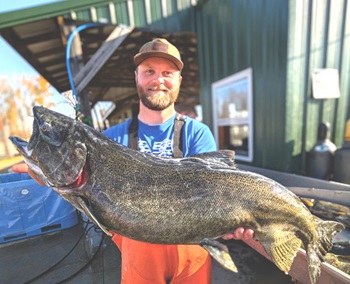 At its monthly meeting in Madison Wednesday, Door County’s Charlie Henriksen told the state Natural Resources Board that the Lake Michigan and Green Bay commercial fishery is still struggling, with some bright spots but many ongoing concerns. Henriksen, chair of the state’s Lake Michigan Commercial Fishing Board, said the ecological challenges of the last 20 years have not abated, and added that fishers are still overcoming the effects of the economic difficulties from the pandemic that limited their opportunities. more, >>CLICK TO READ<<08:17
At its monthly meeting in Madison Wednesday, Door County’s Charlie Henriksen told the state Natural Resources Board that the Lake Michigan and Green Bay commercial fishery is still struggling, with some bright spots but many ongoing concerns. Henriksen, chair of the state’s Lake Michigan Commercial Fishing Board, said the ecological challenges of the last 20 years have not abated, and added that fishers are still overcoming the effects of the economic difficulties from the pandemic that limited their opportunities. more, >>CLICK TO READ<<08:17
Another festival caught selling imported shrimp as ‘Gulf’ shrimp
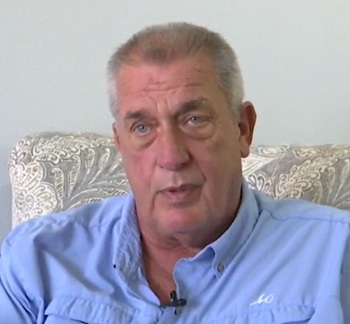 The Morgan City Shrimp and Petroleum Festival was recently in the spotlight for selling imported shrimp. The same consultant group who genetically tested the shrimp continued their investigation at the National Shrimp Festival in Gulf Shores and found the same situation. SeaD Consulting tested five vendors at the National Shrimp Festival that advertised to have Gulf shrimp. Of the five, only one had authentic Gulf shrimp: Rouse’s Supermarket. SeaD Consulting recently found similar results for the Shrimp and Petroleum Festival in Morgan City, with only one of the five vendors sampled actually serving shrimp from the Gulf of Mexico. Video, links, more, >>CLICK TO READ<< 07:39
The Morgan City Shrimp and Petroleum Festival was recently in the spotlight for selling imported shrimp. The same consultant group who genetically tested the shrimp continued their investigation at the National Shrimp Festival in Gulf Shores and found the same situation. SeaD Consulting tested five vendors at the National Shrimp Festival that advertised to have Gulf shrimp. Of the five, only one had authentic Gulf shrimp: Rouse’s Supermarket. SeaD Consulting recently found similar results for the Shrimp and Petroleum Festival in Morgan City, with only one of the five vendors sampled actually serving shrimp from the Gulf of Mexico. Video, links, more, >>CLICK TO READ<< 07:39
Athearn Marine Agency Boat of the Week: 60’x18’x9′ Astor Longliner, Cummins KT 1150
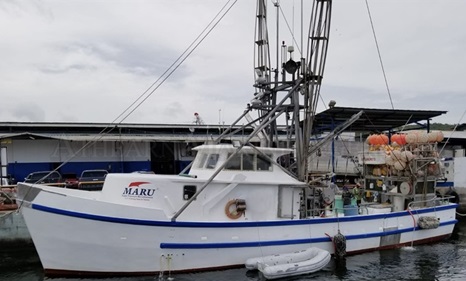 To review specifications, information, and 15 photos’, >click here< To see all the boats in this series, >click here< 06:46
To review specifications, information, and 15 photos’, >click here< To see all the boats in this series, >click here< 06:46
Athearn Marine Agency Boat of the Week: 78′ Steel Shrimp Trawler, Caterpillar 3412TA Diesel
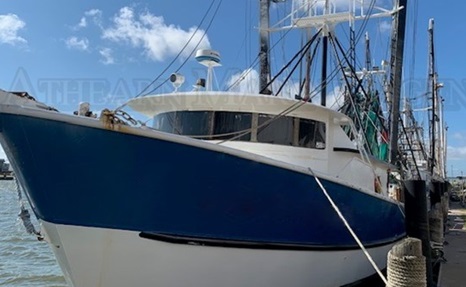 To review specifications, information, and 18 photos’, >click here< To see all the boats in this series, >click here< 07:12
To review specifications, information, and 18 photos’, >click here< To see all the boats in this series, >click here< 07:12
Fishermen Who Were Forced to Pay $700 Per Day to Government-Mandated Observers on Their Boats Get Big News from SCOTUS
 Members of the 18th-century British Parliament, unelected by American colonists, tried to take money from those colonists without their consent. Hence, the American Revolution ensued. On Friday, the U.S. Supreme Court overturned a 40-year-old ruling that had allowed unelected federal regulators, acting the part of the British Parliament, to commit such travesties of justice as requiring fishermen to pay for government-mandated regulators on their boats — a requirement that, according to CBS, could cost the fishermen more than $700 per day. The true magnitude of Friday’s ruling, however, involved far more than fishing boats. In fact, it struck at the heart of American progressivism by eviscerating the insidious claim that federal “experts” know best. In so doing, it took one small-but-crucial step towards dismantling the permanent federal state that actually governs in Washington, D.C. more, >>CLICK TO READ<< 11:18
Members of the 18th-century British Parliament, unelected by American colonists, tried to take money from those colonists without their consent. Hence, the American Revolution ensued. On Friday, the U.S. Supreme Court overturned a 40-year-old ruling that had allowed unelected federal regulators, acting the part of the British Parliament, to commit such travesties of justice as requiring fishermen to pay for government-mandated regulators on their boats — a requirement that, according to CBS, could cost the fishermen more than $700 per day. The true magnitude of Friday’s ruling, however, involved far more than fishing boats. In fact, it struck at the heart of American progressivism by eviscerating the insidious claim that federal “experts” know best. In so doing, it took one small-but-crucial step towards dismantling the permanent federal state that actually governs in Washington, D.C. more, >>CLICK TO READ<< 11:18
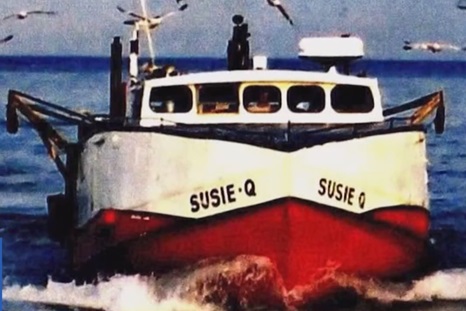
‘We need it desperately’: Great Lakes Commercial Fishermen look for help as industry shrinks
Commercial fishing on the Great Lakes began 150 years ago, and fishermen once numbered in the thousands. Now, only a handful of businesses are still at it, and many are aging out and looking for help. Jamie LeClair represents the fifth generation involved in her family-run commercial fishing business. Titus Seilheimer, a fisheries specialist for the Wisconsin Sea Grant, said the industry needs to start training the next generation of commercial fishermen. “There are concerns. A lot of folks I work with are getting older, and the fleet is getting grayer,” said Seilheimer. “That’s an issue here in the Great Lakes, but really any fishery.” Video, more, >>CLICK TO READ<< 12:57
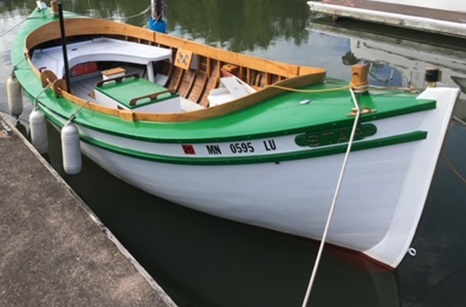
A STAR is Reborn: Fishing boat’s long journey back to original condition, family
When Paul von Goertz first heard that a boat built by the historic Kivela Boatworks Company was being used as a lawn ornament, he knew he had to do something. The “STAR” was built by Jacob Kivela in 1934, for fisherman Sivert Andewson. It was built with the intention of being used to fish the waters of Isle Royale, and so required some special design. “My guess is that Sivert and Jacob Kivela collaborated on the design for the special needs of fishing the exposed waters of Isle Royale,” von Goertz explained. “It was built as a double ender to break following seas, with the beam of the boat forward of amidships so the bow would pop up in a following sea. One does not want to get buried in a following sea as the next wave would push the boat sideways into the trough and from there into a capsize. Pretty smart boat designers!” more, >>CLICK TO READ<< 15:38
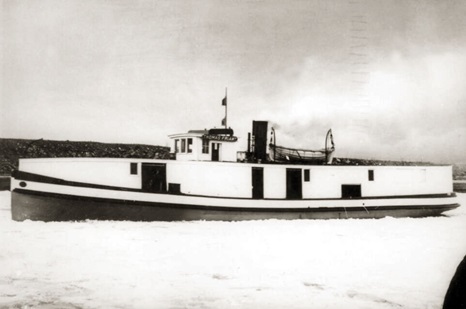
The Day Lake Superior Gave Up Her Dead
The Jones family of Cornucopia, Wisconsin, was well known as both boatbuilders and commercial fishermen on Lake Superior. Thomas Senior and his two sons, Thomas Jr. “Coonie” and Emery, made good money in the fall of 1924 when the price of herring was unusually high.The price of trout was also high at the time, and the men knew they could make even better money if only they could fish trout on the Big Lake after herring season 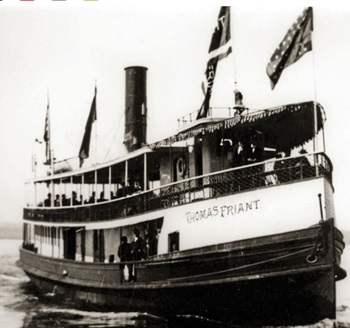 closed. Overwinter fishing on the open Lake had never been done out of the small harbors of the South Shore. Another problem was, the Joneses didn’t have a proper boat capable of staying out beyond the pack ice for any length of time. Enter the Thomas Friant, a 96-by-18-foot abeam, 81-ton wooden hulled ferry built in Grand Haven, Michigan, in 1884. The passenger-hauling Friant had been converted to a massive – for that era – fishing tug. photos, more, >>CLICK TO READ<< 09:06
closed. Overwinter fishing on the open Lake had never been done out of the small harbors of the South Shore. Another problem was, the Joneses didn’t have a proper boat capable of staying out beyond the pack ice for any length of time. Enter the Thomas Friant, a 96-by-18-foot abeam, 81-ton wooden hulled ferry built in Grand Haven, Michigan, in 1884. The passenger-hauling Friant had been converted to a massive – for that era – fishing tug. photos, more, >>CLICK TO READ<< 09:06
IS THE G.A.O. SLOWWALKING ITS INVESTIGATION OF OFFSHORE WIND IMPACTS? By Jim Lovgren
 On June 15, 2023, Congressman Chris Smith issued a press release touting the acceptance by the General Accountability Office [GAO], of a request by the House Natural Resources Committee to investigate a wide range of issues related to the development of offshore wind. The Committee letter, signed by Chairman Bruce Westerman, was submitted on May 15 th , 2023, almost a year ago. I bring this up because the average time-length of most GAO investigations is three months. Which begs the question; Is the Biden administration “slow-walking” the GAO investigation? Slow-walking is the act of purposefully delaying action by stalling, stonewalling, making excuses of how hard it is to do, and other whiney efforts at delaying an investigation until it fails because it is too late. It is the bureaucrat’s favorite weapon of choice when forced to disclose vital information, that their politician benefactors don’t want exposed. more, >>click to read<< 06:10
On June 15, 2023, Congressman Chris Smith issued a press release touting the acceptance by the General Accountability Office [GAO], of a request by the House Natural Resources Committee to investigate a wide range of issues related to the development of offshore wind. The Committee letter, signed by Chairman Bruce Westerman, was submitted on May 15 th , 2023, almost a year ago. I bring this up because the average time-length of most GAO investigations is three months. Which begs the question; Is the Biden administration “slow-walking” the GAO investigation? Slow-walking is the act of purposefully delaying action by stalling, stonewalling, making excuses of how hard it is to do, and other whiney efforts at delaying an investigation until it fails because it is too late. It is the bureaucrat’s favorite weapon of choice when forced to disclose vital information, that their politician benefactors don’t want exposed. more, >>click to read<< 06:10
A Day on the Bay with Métis Commercial Fisherman Bernie LePage
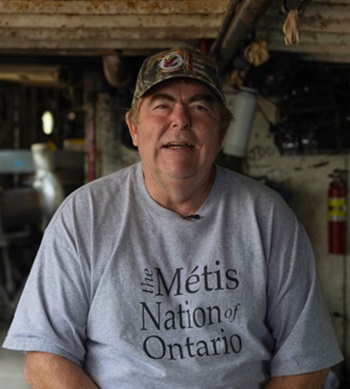 A day in the life of Métis commercial fisherman Bernie LePage starts like any other; with a coffee, a long drive to work and a short walk into the office. For Bernie, his office is the bridge of his fishing tug, and his workplace is the deep blue waters of Georgian Bay. A citizen of the Historic Georgian Bay Métis Community, MNO Region 7, Bernie has been fishing off the coast of Lafontaine since he was a young boy. The LePage family have been fishing out of Penetanguishene Harbour for four generations, dating back to 1861. His ancestors were both blacksmiths and commercial fishermen who used wooden rowboats. “It was tough work just to catch a few fish back then,” says Bernie. Times have certainly changed and the vessel Bernie now uses, which was also used by his father, the ‘Laurie E’, is a 1955 Great Lakes “tug”. The boat was built to handle turbulent waters in Georgian Bay while also hauling tons of fish and fishing gear. more, >>click to read<< 10:00
A day in the life of Métis commercial fisherman Bernie LePage starts like any other; with a coffee, a long drive to work and a short walk into the office. For Bernie, his office is the bridge of his fishing tug, and his workplace is the deep blue waters of Georgian Bay. A citizen of the Historic Georgian Bay Métis Community, MNO Region 7, Bernie has been fishing off the coast of Lafontaine since he was a young boy. The LePage family have been fishing out of Penetanguishene Harbour for four generations, dating back to 1861. His ancestors were both blacksmiths and commercial fishermen who used wooden rowboats. “It was tough work just to catch a few fish back then,” says Bernie. Times have certainly changed and the vessel Bernie now uses, which was also used by his father, the ‘Laurie E’, is a 1955 Great Lakes “tug”. The boat was built to handle turbulent waters in Georgian Bay while also hauling tons of fish and fishing gear. more, >>click to read<< 10:00
“Thar’s gold in them thar gills!” Why this Peoria fish company wants to come to Pekin
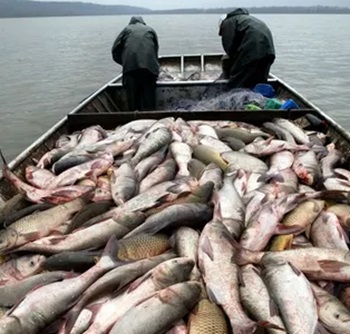 Many central Illinois residents see Asian carp as an invasive species and a hazard to public waterways. But a wholesale and retail fresh water fish processing company sees them as an opportunity and wants to set up a facility in Pekin. Vogel noted that commercial fishermen have been netting carp on the Illinois River for “quite a few years.” While those fishermen have always had access to carp processing plants, he believes Freshwater Solutions proposed Pekin facility can potentially operate on a larger scale. “It’s not just the Asian carp we’re targeting,” he said. “It’s all freshwater species in commercial fishing. What we’re trying to do is build an old industry anew right here in central Illinois.” more, >>click to read<< 08:06
Many central Illinois residents see Asian carp as an invasive species and a hazard to public waterways. But a wholesale and retail fresh water fish processing company sees them as an opportunity and wants to set up a facility in Pekin. Vogel noted that commercial fishermen have been netting carp on the Illinois River for “quite a few years.” While those fishermen have always had access to carp processing plants, he believes Freshwater Solutions proposed Pekin facility can potentially operate on a larger scale. “It’s not just the Asian carp we’re targeting,” he said. “It’s all freshwater species in commercial fishing. What we’re trying to do is build an old industry anew right here in central Illinois.” more, >>click to read<< 08:06
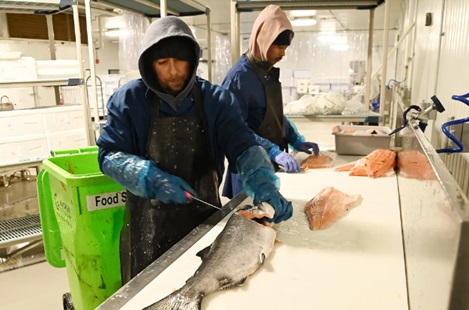
Fish skin, scales touted as future economic boon for Mich., Great Lakes
The fillets that depart Motor City Seafood Co. are tidy, ready to be packaged, shipped and prepared fresh at a Metro Detroit kitchen. They don’t start that way. The Highland Park seafood distributor mostly imports whole fish. Workers fillet them by hand or send them through a system of machines that remove the scales, heads, organs and bones before they are skinned and packed away. Motor City Seafood is left with packages of carefully cut fillets and a big green bucket of the rest — skin, scales, heads, guts. While unsightly when piled in the bucket, those offcuts could be a wellspring for the region’s commercial fish industry. more, >>click to read<< 07:14
18-month search for a Great Lakes shipwreck is the subject of the next DCMM speaker program
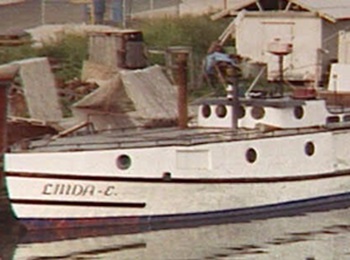 The mysterious disappearance of a commercial fishing boat in Lake Michigan, and the 18-month-long search that followed, is the topic of the next program in the Maritime Speaker Series offered by the Door County Maritime Museum. Brennan Christianson, the museum’s collections coordinator, will present “The Search for the Linda E.” Jan. 4 at the museum’s Sturgeon Bay location. The public can attend the program in person at the museum or see it online via Zoom. The Linda E. was a nearly 40-foot-long vessel designed to haul and set gill nets for commercial fishing, described as a typical Great Lakes commercial fishing boat by the Wisconsin Shipwrecks website. more, >>cick to read<< 07:55
The mysterious disappearance of a commercial fishing boat in Lake Michigan, and the 18-month-long search that followed, is the topic of the next program in the Maritime Speaker Series offered by the Door County Maritime Museum. Brennan Christianson, the museum’s collections coordinator, will present “The Search for the Linda E.” Jan. 4 at the museum’s Sturgeon Bay location. The public can attend the program in person at the museum or see it online via Zoom. The Linda E. was a nearly 40-foot-long vessel designed to haul and set gill nets for commercial fishing, described as a typical Great Lakes commercial fishing boat by the Wisconsin Shipwrecks website. more, >>cick to read<< 07:55
Euclid Fish Co. pledges to use 100 percent of Great Lakes fish caught
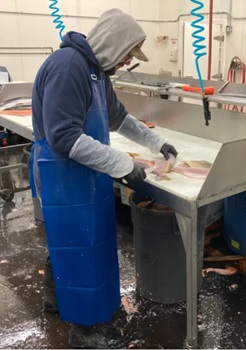 A Mentor-based company has made a commitment to increasing the value and usefulness of fish caught in the Great Lakes. Euclid Fish Co. has signed on to the “100 percent Great Lakes Fish Pledge,” publicly committing to using 100 percent of each commercially caught Great Lakes fish productively by 2025, according to a corporate news release. As part of the pledge, Euclid Fish will explore and implement innovative applications for fish byproducts including fertilizer, protein, marine collagen, leather and other new, high-value products. According to the release, the Great Lakes are home to a sizeable commercial fishery, but only the fillets of these fish are usually eaten while the remaining 60% of the fish is relegated to inexpensive animal feed or discarded. more, >>click to read<< 09:34
A Mentor-based company has made a commitment to increasing the value and usefulness of fish caught in the Great Lakes. Euclid Fish Co. has signed on to the “100 percent Great Lakes Fish Pledge,” publicly committing to using 100 percent of each commercially caught Great Lakes fish productively by 2025, according to a corporate news release. As part of the pledge, Euclid Fish will explore and implement innovative applications for fish byproducts including fertilizer, protein, marine collagen, leather and other new, high-value products. According to the release, the Great Lakes are home to a sizeable commercial fishery, but only the fillets of these fish are usually eaten while the remaining 60% of the fish is relegated to inexpensive animal feed or discarded. more, >>click to read<< 09:34
Bay Port Fishing Company: A 128-year legacy in Huron County
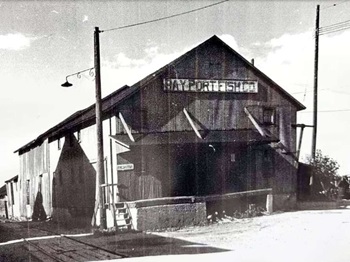 For the last 128 years, the Bay Port Fishing Company has been on the mountaintop, withstood troubling times, and still provided fresh fish year-round to the residents of Huron County and beyond. The Bay Port Fishing Company was established in 1895 off the dock of Bay Port between Lake Huron and Saginaw Bay, by W.J. Orr and W.H. Wallace. During the early years, fisherman used sailboats to make runs, placing and tending their nets. During the winter months, they chopped holes through the ice to continue fishing and preserving the catches in salt and packed them up in kegs. Photos, more, >>click to read<< 10:12
For the last 128 years, the Bay Port Fishing Company has been on the mountaintop, withstood troubling times, and still provided fresh fish year-round to the residents of Huron County and beyond. The Bay Port Fishing Company was established in 1895 off the dock of Bay Port between Lake Huron and Saginaw Bay, by W.J. Orr and W.H. Wallace. During the early years, fisherman used sailboats to make runs, placing and tending their nets. During the winter months, they chopped holes through the ice to continue fishing and preserving the catches in salt and packed them up in kegs. Photos, more, >>click to read<< 10:12
‘Catalytic.’ How a bipartisan bill could save working waterfronts from Cape Cod to Alaska
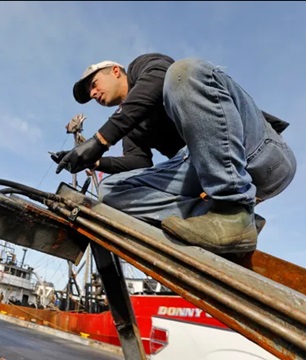
Andrew Spalt climbs the side of the new hydraulic dredge ramp he is installing aboard his boat Miss Emma.
The Working Waterfront Protection Act (S-3180) would establish a grant program that would support working waterfronts in coastal states, including the Great Lakes. The act would provide $20 million annually through fiscal 2028. Commercial fishing cooperatives, working waterfront owners and operators, nonprofit organizations and municipal and state governments would be eligible to apply. Fishing Communities Coalition Coordinator Noah Oppenheim said support is crucial because of pressures facing working waterfront owners and fishing communities nationwide. The coalition represents more than 1,000 independent small boat fishermen and business owners from Maine to Alaska, according to its website. 8 photos, more, >>click to read<< 09:38






